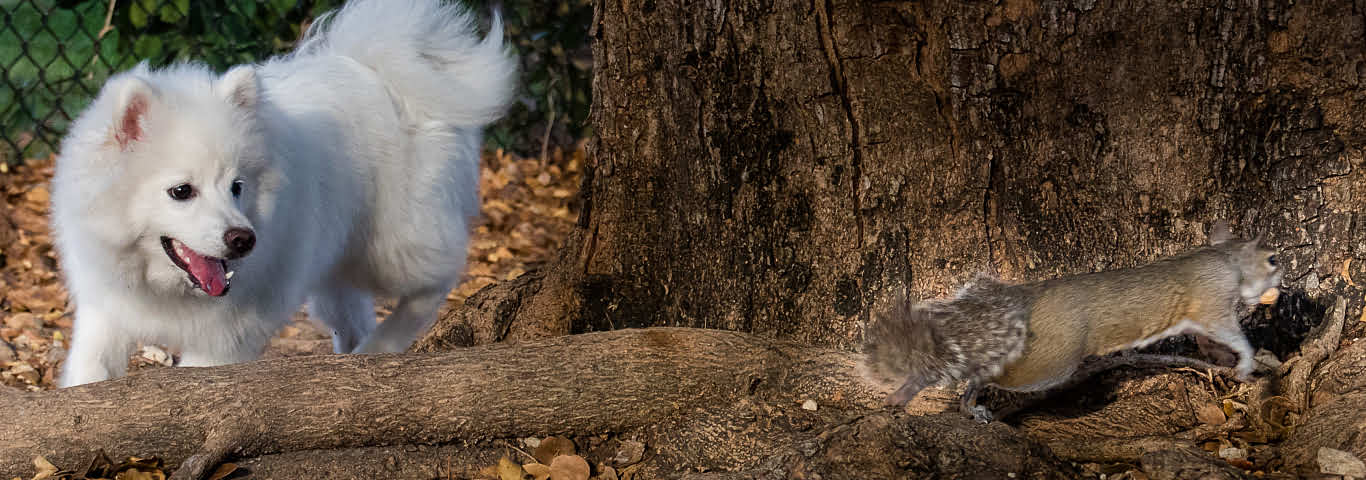
Dogs chasing squirrels is a common and instinctual behavior deeply rooted in their evolutionary history and biology. This behavior can be explained by a combination of factors, including genetics, sensory perception, and natural instincts.
-
Predatory Instinct: One of the primary reasons dogs chase squirrels is their innate predatory instinct. Dogs are descendants of wolves, which were skilled hunters in the wild. This instinct to pursue and capture prey is still present in domesticated dogs, although it may manifest differently. When a dog sees a squirrel, it triggers their natural hunting drive, compelling them to give chase.
-
Movement and Sound: Squirrels are small, fast-moving creatures that make rapid and unpredictable movements. Dogs are highly attuned to motion and sound, and the sudden darting of a squirrel, along with the rustling of leaves or the chattering of the squirrel, stimulates a dog's interest and activates their hunting instincts. This combination of visual and auditory stimuli is irresistible to most dogs.
-
Exercise and Stimulation: Dogs need regular physical and mental stimulation to stay healthy and happy. Chasing squirrels provides an excellent opportunity for both. It engages their muscles, sharpens their reflexes, and keeps their minds active. For many dogs, this activity serves as a form of exercise and entertainment, helping to burn off excess energy.
-
Social Learning: Dogs are observant and can learn behaviors from other dogs in their environment. If a dog sees another dog chasing squirrels, they may imitate this behavior, especially if it appears fun or rewarding. Social learning can reinforce the behavior within a community of dogs.
-
Breed-Specific Traits: Some dog breeds have a stronger prey drive than others due to their historical roles as hunting or working dogs. Breeds like Border Collies, Terriers, and Greyhounds are more likely to chase squirrels due to their genetic predisposition for hunting and pursuing small animals.
-
Hunger and Survival Instincts: In the wild, hunting was essential for a dog's survival. Although domesticated dogs are typically well-fed by their owners, their ancestral instincts may drive them to chase squirrels out of a lingering sense of hunger or a subconscious belief in the need to secure their own food.
-
Playful Nature: Dogs often view chasing squirrels as a game. The thrill of the chase and the potential to catch the elusive squirrel can be highly rewarding for them. It satisfies their playful instincts, even if they don't intend to harm the squirrel.
-
Territorial Behavior: Dogs are territorial animals, and they may perceive squirrels as intruders in their space. Chasing squirrels can be a way for dogs to assert their dominance over their territory and maintain a sense of security.
-
Lack of Consequence: In many cases, dogs may never catch the squirrels they chase. This lack of success doesn't deter them because the pursuit itself is rewarding. Dogs often enjoy the thrill of the chase, even if they don't catch their prey.
It's important to note that while chasing squirrels is a natural behavior for dogs, it can sometimes lead to problems, such as excessive barking, escaping, or running into dangerous situations like traffic. Responsible dog owners should provide appropriate training and supervision to ensure their dog's safety and the safety of other animals. This might involve teaching a strong recall command to call the dog back when needed or using a leash and harness to control their movements during walks. Ultimately, understanding the reasons behind this behavior can help dog owners manage it effectively while allowing their pets to indulge in their natural instincts in a controlled and safe manner.
